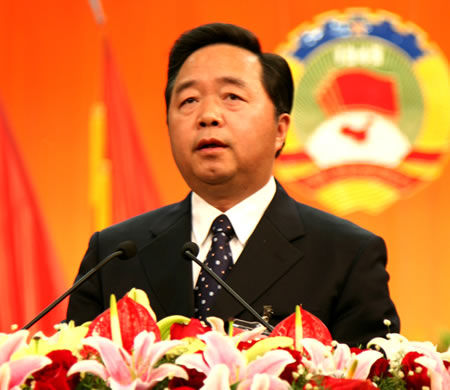

Finally, another "rumor" comes true: The mayor of Nanjing, Jiangsu province, is under investigation for alleged economic misconduct.
Seniority-wise, a Nanjing mayor, equivalent to a central-government vice-minister, may not necessarily qualify as the "tigers" Party leader Xi Jinping referred to in his remarks on the anti-graft campaign.
Still, the investigation is a well-received follow-up to Xi's promise that the crusade against corruption will not just target "flies". At least in Nanjing.

Ji Jianye, mayor of Nanjing, capital of east China's Jiangsu Province, is under investigation for suspected discipline and law violations, the discipline watchdog of the Communist Party of China (CPC) revealed on Thursday. [File photo / Xinhua]
Local residents reportedly bade farewell to Ji Jianye, their disgraced mayor, with firecrackers and humorous toasts.
It does not surprise us how unpopular the Nanjing mayor is. He is known for carrying out large-scale urban renovation projects which involved billions of yuan in investment in defiance of public opinion. His decision to uproot the city's signature London plane trees to make way for subway lines triggered citywide protests.
Though he kept saying he wanted to be a people's mayor who listened to the public "in earnest", he ignored what the people of Nanjing said about his expensive renovation program that has damaged the city's sense of history.
His colleagues were not taken by surprise either, and said that his fate was "only a matter of time" or that the probe had been "widely expected". But what is surprising is how long allegations have hounded him.
Reports suggest that Ji's problems date back to his years in Yangzhou in the same province, where he was mayor, Party chief and chairman of the local legislature.
Yet in spite of all the "rumors" about his misdeeds, he was promoted, all the way to the provincial capital, as acting mayor, mayor and deputy Party secretary. But he was not investigated until just some days ago.
Ji's case corroborates a media consensus that has emerged in the ongoing "self and mutual criticism" sessions in Party and government institutions throughout China: The official appointment mechanisms have to be adjusted.
Moreover, as echoed frequently during the current campaign, apart from inviting sharp criticisms, those in power must also attend to people's concerns with down-to-earth steps to effectively solve their problems.
(China Daily 10/18/2013 page8)